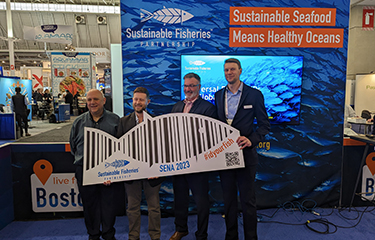The Sustainable Fisheries Partnership (SFP) launched multiple new pilot projects with High Liner Foods, Chicken of the Sea Frozen Foods, and Publix Super Markets to design and test the use of universal fishery IDs.
The project, announced in an event at the 2023 Seafood Expo North America, will be partially funded by the United Nations Development Program (UNDP). The SFP is working with the U.N. Food and Agriculture Organization (FAO) to create the unique IDs, which SFP said have the potential to “transform the seafood industry.”
“Today is a culmination of many years of work that we've been doing at SFP,” SFP Global Policy Director Brad Spear said at the event. “Essentially what we're doing is developing a standard and a code for identifying every fishery and every stock in the world, which we think has some massive implications for traceability for data collection for just raising the visibility of seafood in general.”
SFP currently has multiple pilot projects, funded through the UNDP, that will test the real-world applications of its ideas for unique IDs. One of those is a national management plan for blue swimming crab in the Philippines that SFP is performing in cooperation with the Philippines government.
“They’re interested in using the IDs to raise the profile of the work that they're doing on the ground, connecting that information to the market to the consumers, who are increasingly more interested in that information,” Spear said.
A universal ID will essentially function like a universal product code, and be assigned to every source fishery in the world in a standard developed by global fishery efforts. The standard is being backed by the FAO via the Global Record of Stocks and Fisheries, and it will create a common “language” that fisheries across the world can use to quickly identify the origins of seafood.
Thai Union North America Director of Sustainability Blake Stok said creating universal IDs is another step toward increasing transparency and traceability throughout the seafood supply chain – augmenting the efforts of organizations like the Global Dialogue on Seafood Traceability.
“It's going to build on the requirements that are embedded in that and really give us that extra layer of granularity that is again standardized and it moves throughout the supply chain in a digital way that really helps transfer information through to us as the importer but also to our customers as well,” Stok said. “And ultimately ... being able to tell that story of the sustainability of the fishery that we're sourcing from. So we're really excited about it, and I look forward to seeing where this goes.”
High Liner Foods Vice President of Sustainability and Government Affairs Bill DiMento said the project and its goals is something that has been “near and dear” to him.
“I helped High Liner start its journey into sustainability in 2010, and at that very time we started to learn that all of our customers were looking for ways to report, with no standardized way to report,” DiMento said. “So this is another step toward standardizing all the reporting for all of our customers, which will make life a lot easier and simpler for everybody.”
DiMento, speaking with SeafoodSource after the event, said ...
Photo by Chris Chase/SeafoodSource








